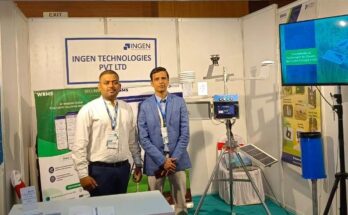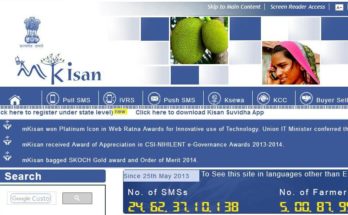India Meteorological Department (IMD) runs an operational Agrometeorological Advisory Services (AAS) viz., Gramin Krishi Mausam Sewa (GKMS) scheme for the benefit of farming community in the country. Under the scheme, medium-range weather forecasts at district and block level is generated and based on these forecasts, 130 Agromet Field Units (AMFUs), located at state agricultural universities, institutes of Indian Council of Agricultural Research (ICAR) and Indian Institute of Technology (IIT), prepare Agrometeorological advisories on every Tuesday and Friday for the districts under their jurisdiction and for the blocks of the district of their location and communicate to the farmers to take decision on day-to-day agricultural operations. AAS rendered by IMD is a step towards weather-based crop and livestock management strategies and operations dedicated to enhancing crop production and food security besides reducing crop damage and loss due to unusual weather, Minister of State (I/C) for Earth Sciences and M/o Science & Technology, Dr. Jitendra Singh said in a written reply in Lok Sabha today.
After successful implementation of district level AAS, District Agromet Units (DAMUs) are being established at Krishi Vigyan Kendras (KVKs) in collaboration with ICAR to implement block level AAS. To date, 199 District Agromet Units (DAMUs) have been established at KVKs across the country under ICAR network and these DAMUs prepare district and block level Agrometeorological Advisories based on district and block level weather forecasts for their respective districts and communicate to the farmers on every Tuesday and Friday. In addition to that, Impact based forecasts (IBFs) for agriculture are also being prepared by AMFUs and DAMUs based on the severe weather warnings for different districts of various states and union territories across the country, the minister further said.
You may also like to read: ICRISAT, TEZ call entrepreneurs eyeing ag and food-tech startup domain
IMD also monitors rainfall situations and weather aberrations and issues alerts and warnings to the farmers from time to time under GKMS (Gramin Krishi Mausam Sewa) scheme. SMS-based alerts and warnings for extreme weather events along with suitable remedial measures are issued to take timely operations by the farmers. Such alerts and warnings are also shared with state departments of agriculture for the effective management of calamity, Singh informed the Lok Sabha.
Agrometeorological Advisories are disseminated to the farmers through multichannel dissemination systems like print and electronic media, Doordarshan, radio and internet including SMS using mobile phones through Kisan Portal and also through private companies under public-private partnership (PPP) mode. The number of farmers receiving SMS varies depending on the population of the farming community and the area under cultivation, the minister further informed the lower house of Indian parliament.
Farmers access the weather information including alerts and related agrometeorological advisory specific to their districts through the mobile App viz., ‘Meghdoot’ launched by Ministry of Earth Sciences, Government of India. These weather details are also accessible by farmers through another App ‘Kisan Suvidha’, launched by Ministry of Agriculture & Farmers Welfare.
Social media is also used for quicker dissemination of forecasts and advisories to the farmers. At present farmers of 119,554 villages in 3,598 blocks have been covered through 16,140 WhatsApp groups. State agriculture department officials of district and block level are also included in these WhatsApp groups. Continuous efforts are being made to increase the number of farmers and villages covered to disseminate Agrometeorological advisory using WhatsApp, he said.
You may also like to read: New age tech entrepreneurs disrupting agriculture ecosystem in India
In addition to above, advisories are also being circulated through a number of Facebook pages created by AMFUs and DAMUs. Initiative on collaboration with State government has been taken up for the integration of weather forecast and Agrometeorological advisories with state government mobile apps and websites. The integration has been completed for Bihar, Chhattisgarh, Gujarat, Haryana, Madhya Pradesh, Nagaland, Rajasthan, Tamil Nadu and Uttarakhand and about 6 million farmers of these states are getting benefitted from weather forecast and agrometeorological advisories, the minister further informed.
IMD is also taking continuous efforts to popularise the services among the farming community by organising Farmers’ Awareness Programmes (FAPs) in collaboration with AMFUs and DAMUs in various parts of the country. IMD along with the experts from AMFUs and DAMUs also participate in Kisan Melas and Farmers’ Day to create awareness about the services, so that more farmers get benefitted, Singh said in the Lok Sabha.
To upgrade the forecasting capabilities and enhancement in weather and climate services throughout the country including Agromet Advisory Services various activities are underway in India Meteorological Department (IMD) under the umbrella Central sector scheme ACROSS. There are four sub-schemes of IMD under ACROSS namely, Atmospheric Observation Network (AON), Upgradation of Forecast System (UFS), Weather & Climate Services (WCS) and Commissioning of Polarimetric Doppler Weather Radars (PDWR) aimed at expansion of observational network and improvement in weather and climate services, the minister concluded.





